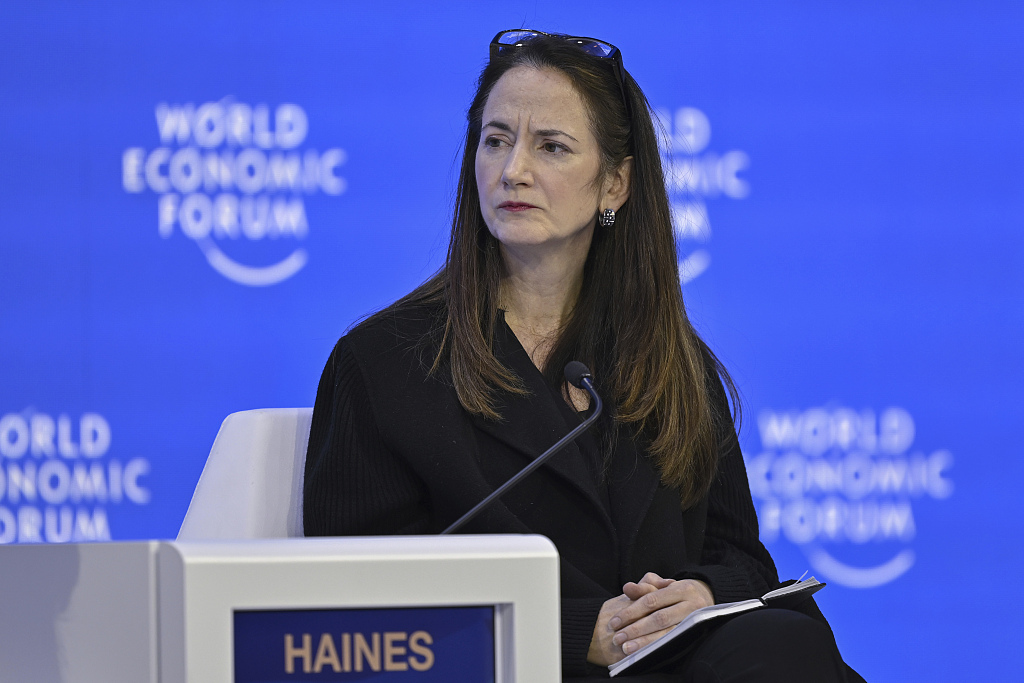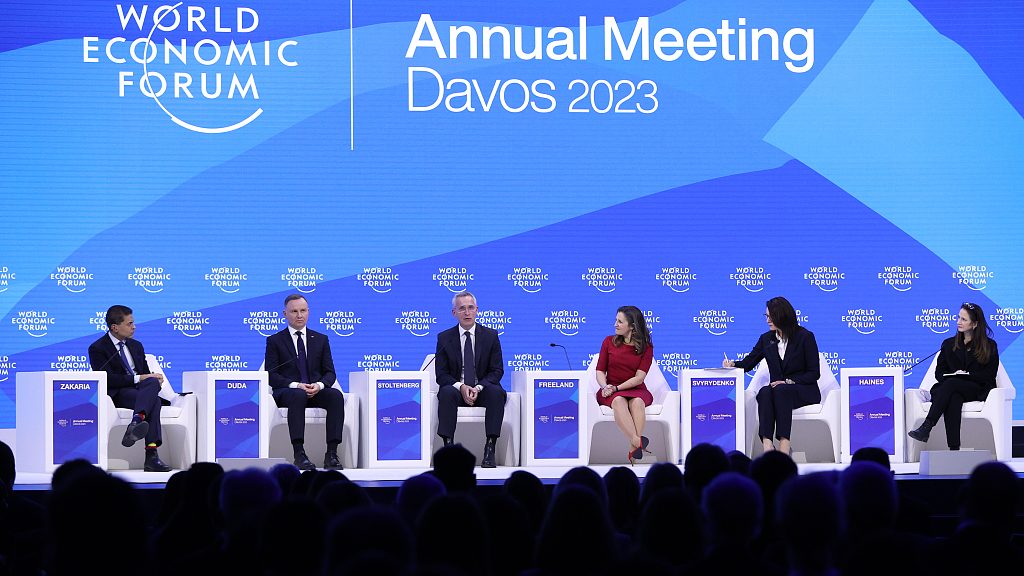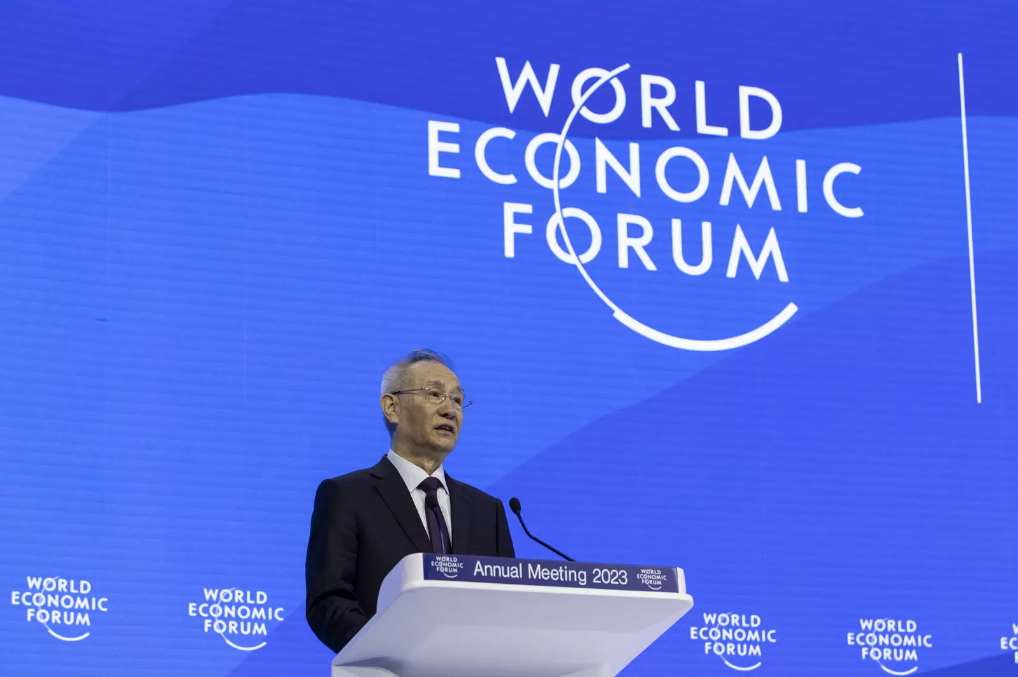
Avril Haines, U.S. Director of National Intelligence, attends a panel discussion during the 53rd annual meeting of the World Economic Forum, WEF, in Davos, Switzerland, January18, 2023. /CFP
Avril Haines, U.S. Director of National Intelligence, attends a panel discussion during the 53rd annual meeting of the World Economic Forum, WEF, in Davos, Switzerland, January18, 2023. /CFP
Editor's note: Abhishek G Bhaya is a senior journalist and international affairs commentator. The article reflects the author's opinions and not necessarily the views of CGTN.
As some of the world's top business and political elites convene in the Swiss Alpine resort city of Davos for the ongoing 53rd annual meeting of the World Economic Forum (WEF) to chart a way forward amid multiple global turmoils, the United States appears to be working at cross-purpose with the stated objective of this year's WEF theme of "Cooperation in a Fragmented World."
True to its "hegemonic" behavior, the U.S. used the multilateral forum to yet again weaponize economic sanctions, targeting China (along with Russia) this time, even as most participants in Davos emphasized the significance of "connecting, cooperating and collaborating with the international community" in dealing with global challenges.
Addressing a panel discussion on the topic of "Restoring Security and Peace" at the annual forum on Wednesday, U.S. Director of National Intelligence Avril Haines argued that due to Beijing's closer integration with the world economy, significant Russia-like sanctions by the West would have a greater impact on China.
"I think one of the challenges is that sanctions in the context of Russia versus China have some interesting differences. So, if you were to enact a significant amount of sanctions vis-à-vis China, you're likely to have a greater impact on China because of its integration with the world economy," the top U.S. intelligence official said, noting however that, "At the same time, it will also create more sacrifice, essentially, on those who are enacting those sanctions."

L-R: American journalist Fareed Zakaria, Polish President Andrzej Duda, NATO Secretary General Jens Stoltenberg, Canadian Foreign Minister Chrystia Freeland, Ukrainian Economy Minister Yuliia Svyrydenko and U.S. Director of National Intelligence Avril Haines participate in a panel discussion titled "Restoring Security and Peace" during the World Economic Forum (WEF) in Davos, Switzerland, January 18, 2023. /CFP
L-R: American journalist Fareed Zakaria, Polish President Andrzej Duda, NATO Secretary General Jens Stoltenberg, Canadian Foreign Minister Chrystia Freeland, Ukrainian Economy Minister Yuliia Svyrydenko and U.S. Director of National Intelligence Avril Haines participate in a panel discussion titled "Restoring Security and Peace" during the World Economic Forum (WEF) in Davos, Switzerland, January 18, 2023. /CFP
Predictably, China condemned Haines' remarks on Thursday, stressing that the U.S. "addiction" to sanctions will end up causing more harm and chaos to the world.
"Sanctions have become the go-to tool for some people in the U.S. They weaponize economic and technology issues and use them as a tool," Chinese Foreign Ministry Spokesperson Wang Wenbin said. "This poses a serious threat to global peace and stability."
Wang noted that Haines' remarks smack of U.S. hegemonism. "It's self-serving practice at the expense of others and the chaos it creates around the world is both unpopular and bound to be resisted and rejected by the world," he added.
In contrast, Chinese Vice Premier Liu He, in his special address in Davos on Tuesday, called for international cooperation… and placing economic development as the "primary and central task" while also emphasizing Beijing's stated goals of achieving common prosperity and building a community with a shared future for mankind.
"We need to uphold the right principles and maintain the effective international economic order," Liu stressed. "Under the new circumstances, the traditional way of thinking cannot provide the solution. That is why we have to abandon the Cold War mentality, try to understand the nature of things from the perspective of material duality, endeavor to build a community with a shared future for mankind and join hands to respond to global challenges."

Chinese Vice Premier Liu He delivers a speech at the World Economic Forum (WEF) Annual Meeting 2023 in Davos, Switzerland, January 17, 2023. /World Economic Forum
Chinese Vice Premier Liu He delivers a speech at the World Economic Forum (WEF) Annual Meeting 2023 in Davos, Switzerland, January 17, 2023. /World Economic Forum
The difference in the approaches between the Chinese and American leadership is out there for everyone to see.
The U.S.'s punitive approach, hinged on the arm-twisting of perceived rivals and opponents, is evidently rooted in Cold War principles and reveals the arrogance and insecurity of a declining superpower and the fear of losing its hegemonic status.
Whereas China's inclusive approach and emphasis on multilateralism and collective human growth stem from the confidence of an emerging superpower with the deep wisdom of an ancient civilization that also understands the power of humility.
In the post-Cold War period, Washington has weaponized the economic sanctions to punish scores of nations, including its partners and allies, which in many ways have harmed the U.S.'s own economic interests in the world without improving its national security – a common objective that the U.S. cites for imposing such sanctions.
The U.S. likes to see itself as a global policeman and routinely uses economic sanctions as the ultimate weapon to discipline or coerce what it sees as "rogue nations" to toe the American line. What it fails to see is that such conceited actions make the U.S. increasingly resemble a rogue nation.
Having rallied its Western allies to punish Russia with the harshest possible economic sanctions over Moscow's military action in Ukraine, the U.S. is relentlessly pushing its allies and partners for similar sanctions against China.
As such, Haines' latest remarks in Davos not only reflect the U.S.'s morbid obsession with economic sanctions but also a clear attempt to subvert the multilateral forum that is looking to arrive at solutions to global challenges in a truly fragmented world through international cooperation.
(If you want to contribute and have specific expertise, please contact us at opinions@cgtn.com. Follow @thouse_opinions on Twitter to discover the latest commentaries on CGTN Opinion section.)